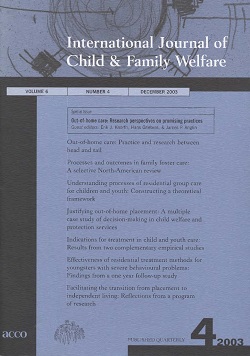Indications for treatment in child and youth care: Results from two complementary empirical studies
Keywords:
child and youth care, indication for treatment, decision-making, youth care officeAbstract
The central issue in this contribution is the analysis of indications for treatment (IFT) in Dutch child and youth care. In the Netherlands under the new Youth Care Act, clients can only obtain intensive forms of child and youth care on the basis of a so-called written IFT-statement. Two studies are presented: one investigating the general quality of the IFT-statements (N = 270), the other focusing in more detail on the quality of IFT-statements (N = 227). The main question in both studies is to what extent IFT-statements meet the basic requirements that represent a well-founded and explicit decision. The first study reveals that the assessment of IFT-statements by a committee of experts yields the verdict 'agreed' in only two out of three cases. Some IFT-statements receive the stamp 'agreed' even though the case is insufficiently substantiated. In the second study IFT-statements are being assessed by applying objective standards, as well as by consultation with case managers and clients themselves. It turns out that the assessment of the IFT-statements by use of the objective standards paints a more disadvantageous picture than consulting the case managers. The latter, in turn, are more critical about the IFT-statements than the clients. The authors advocate to make IFT-statements more explicit and, by doing so, to contribute to an increased transparency of the decision-making process at the entrance into child and youth care services.

